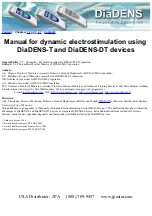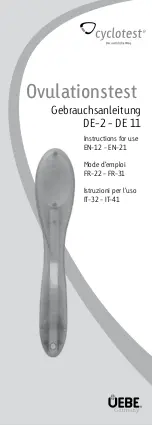
::
Manual for dynamic electrostimulation using
DiaDENS-T and DiaDENS-DT devices
General Editor,
V.V. Chemyshev, Medical Consultant for DENAS MS Corporation
Editor,
K.Yu. Cheremkhin, Medical Director of DENAS MS Corporation
Authors:
A.A. Vlassov, Doctor of Medicine, Associate Professor, Head of Department of DENAS MS Corporation;
V.V. Malakhov, Doctor of Medicine, researcher for DENAS MS Corporation;
N.B. Nikolaeva, researcher for DENAS MS Corporation;
A.A. Safronov, researcher for DENAS MS Corporation;
M.V. Umnikova, Doctor of Medicine, Assistant Professor, Internal Medicine and Advanced Training Faculty at Ural State Medical Academy.
E-book version was created by Pavel Maslennikov, doctor-neurologist, manager, web-programmer.
http://www.zoodens.com
Reviewers:
A.M. Vassilenko, Doctor of Medicine, Professor, Head of Department of Reflex and Manual
at Moscow State Medical-Sanitary
University (City of Moscow).
This publication is an appendix to "Manual for Dynamic Electrostimulation Using DENAS Devices." The publication describes in detail the
advantages of DiaDENS-T and DiaDENS-DT devices as compared to DENAS devices, lists additional treatment methods for various
diseases, using the new expanded diagnostic and therapeutic possibilities afforded by DiaDENS devices
.
© Author Collective, 2006
© Limited liability company RTS ART, 2006
© Limited liability company Tokmas-Press, 2006
© Limited liability company RIF SANED, 2006
USA Distributor: JPA (888) 709-9457 www.jpastar.com
Summary of Contents for DiaDENS-DT
Page 25: ......
Page 50: ......
Page 65: ...77 Hz at the ER 2 range for 3 5 minutes on each side ...
Page 93: ...Straight projection of the nose ...
Page 94: ...Submandibular zone ...


































